Award Winners from PMA
The Produce Marketing Association’s Fresh Summit Convention & Expo took place last week in Anaheim, California, and, while I wasn’t able to make it this year, I did receive news from several growers about new introductions and awards to share.
First off, the awards. Mucci Farms took home the Best Sustainable Packaging prize for its Simple Snack plastic-free, backyard compostable series of packaging. The new packaging includes a tray made from agricultural waste and the lidding film is made of sugar cane and wood fibers.
“Consumer feedback over the last several months has been almost exclusively focused on the reduction of plastic, so we feel like we’ve addressed that concern by coming up with a truly plastic-free package,” says Packaging Development Manager Fernanda Albuquerque. “We also saw the value of being able to add key messaging to the tray, which gave our designers a larger canvas for branding, information and education.”
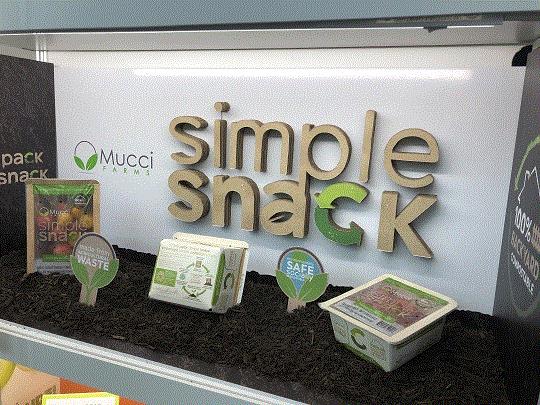
SUNSET Wow Berries took home the Best Product Promo award. We saw that product—a line of strawberries, blueberries, raspberries and blackberries—at this summer's United Fresh Show in Chicago. The promotion Better Than Chocolate highlights the flavor profiles of the berries.
“We’re thrilled that WOW berries were a judges’ favorite,” says Paul Mastronardi, President and CEO of Mastronardi Produce. “Initial retailer and customer response to these remarkable berries has been tremendous and our team was incredibly excited to showcase them at PMA.”
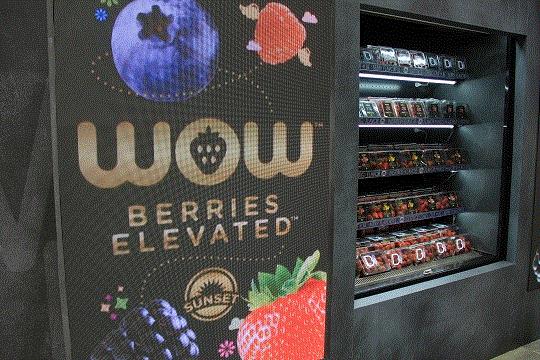
A photo of a WOW Berries display from this summer's United Fresh show in Chicago.

New Intros from PMA
I checked in with the media crew at PMA and they confirmed a record-breaking attendance of nearly 24,000 attendees at this year’s show. That’s a lotta people. If you went, I’d love to hear your thoughts about what you saw there and any new products that caught your eye. Email me HERE.
I did receive word of a couple of new introductions made at the show—one coming from Pure Flavor, a Canadian-based greenhouse grower. The company debuted its RedRoyals Cherry Tomatoes on the Vine at the show, which has been the result of years of research and development. The tomatoes are described as “flavor rich with a vibrant sweet crunch.” The tomatoes were selected after researching consumer trends, trialing dozens of varieties and conducting community sensory testing, according to the company.
According to Chief Marketing Officer Chris Veillon, these will be grown in all Pure Flavor facilities, but will start with the newer greenhouses in Peach County, Georgia, this fall and winter. The first crop is expected to be picked in the next two to three weeks.
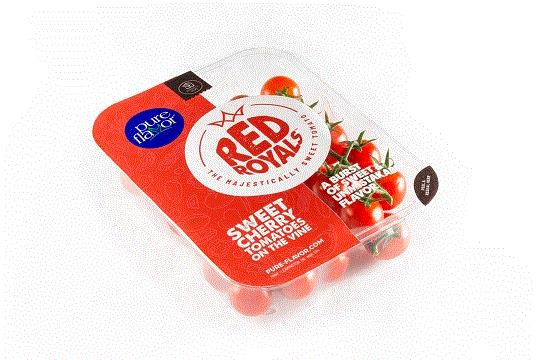
Attendees at the show also saw DelFrescoPure’s YES!Berries strawberries for the first time. The company says it's the “first and only grower in North America to grow SCS Certified Pesticide Free strawberries."
“Consumers are demanding more, and rightfully so. Delivering delicious, nutritious snacks all-year-round is no longer enough,” says Carl Mastronardi, president of Del Fresco Produce Ltd. “They want to reduce their risk of exposure to pesticide residues in foods they consume and rightfully so. This certification independently assures consumers that our greenhouse-grown strawberries do not have pesticide residue."
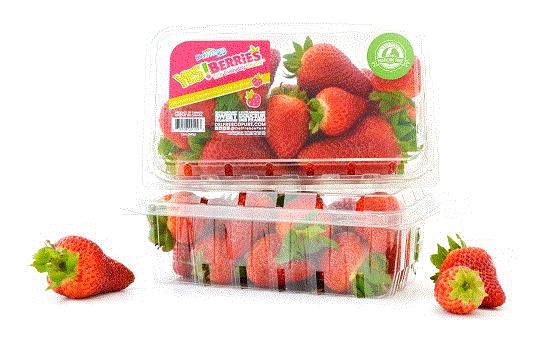
The berries are a result of an integrated pest management program used in the 17-acre growing range in Kingsville, Ontario. The certification is conducted by a California company, SCS Global Services, a third-party certifier of environmental, sustainability and food safety claims.

AR Labels from Wish Farms
This one didn’t fall under either of the above items, so I pulled it out on its own. It’s a new packaging technology from Wish Farms that debuted at PMA allowing customers to use augmented reality (AR) to bring labels to life through their smartphones. I’ve seen this technology in action before—Burpee bought a company not too long ago called Powerful Plants that used the technology on seed packets.
Wish Farms will start using it in January 2020 on all four berry labels (strawberries, blueberries, blackberries and raspberries). Consumers download the Wish Farms app and open it on a smartphone or tablet, then hover the camera over the product label. A video will appear overlaid onto the label through the display.
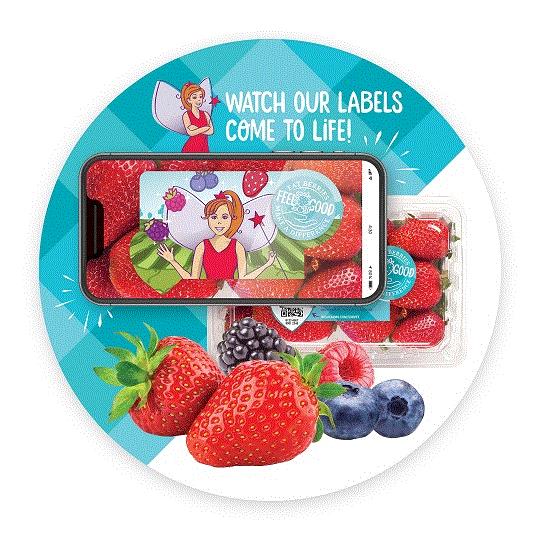
“I wanted us to be the first in our industry to utilize this technology,” says owner Gary Wishnatzki, who references Misty the Garden Pixie, a marketing campaign to drive brand engagement. “Misty is such an asset to our brand. Bringing her to life in this fun way is just another chance for us to connect and get more people excited about being a Wish Farms berry lover.”
Just a side note: If you'd like to see first-hand all the new products from next year's PMA Fresh Summit, mark your calendar now for October 15-17, 2020 in Dallas, Texas.

New Strawberry Research from UNH
Researchers at the New Hampshire Agricultural Experiment Station at the University of New Hampshire were able to more than double the annual yield of strawberries and quadruple the length of the harvest up in New Hampshire. How did they do it?
The improvements are a result of the five-year, multi-state TunnelBerries project that looked at the differences in yield and quality among varieties of dayneutral varieties, as well as the effect of low tunnel protective structures on yields and plant growth.

The results can be a “road map” for growers who are looking to increase local production in times outside the peak strawberry season.
“Our study shows that local strawberries can be grown from early summer through late fall in our area,” says Kaitlyn Orde, a research associate who worked with experiment station researcher Becky Sideman. “This is yet another illustration of the diversity of crops that can be grown in this part of the country during months that were previously considered off season.”
Researchers evaluated eight dayneutral varieties: Albion, Aromas, Cabrillo, Monterey, Portola, San Andreas, Seascape and Sweet Ann. They produced fruit from early July into November in both years, according to researchers. The low tunnels, meanwhile, increased the percent marketable yield by about 10% in both years of the study, and increased marketable yields during the last six weeks of the 2018 season, from mid-September to late October.
You can read the full story HERE. Also, growers in Northeast Ohio can feel free to try to replicate this study—I would love some fresh strawberries right about now.

MSU's Hemp Survey
Michigan State University is hoping to hear from growers who are either interested in growing industrial hemp or currently growing it, whether it’s in the field or under cover. Researchers at the university are hoping to understand hemp production and identify production challenges with a confidential survey.
CLICK HERE for the link to the survey. It should take about 10 minutes and all individual responses will remain confidential.
You can CLICK HERE, too, for more about the survey, including contact information for the researchers conducting the survey.
M.I.T.’s Quandary
Recently The New York Times published a story highlighting a project called OpenAg—a climate controlled mini-greenhouse designed to be a “personal food computer” able to grow crops in thin air, without soil or even sunlight. The problem is, other researchers at M.I.T. say the project was promoted through misleading claims, and that the system doesn’t work nearly as well or grow with as much precision as at least one researcher claimed.
That researcher, Caleb Harper, leads the project and, according to the story, came to prominence via a 2015 Ted Talk where he described the personal food computer (HERE’s the LINK to the Ted Talk, with the caveat that it’s now under review by TED’s editors).
The New York Times story says during one instance a researcher was told to go buy a lavender plant at a local store before photos were taken. In another instance lighting was manually rigged to provide the right light level during a demonstration instead of happening automatically. Harper did not respond to requests for interviews by the NYT.
You can read the full story HERE.



As always, feel free to email me at jpolanz@ballpublishing.com with comments, questions, news and views.
Until next time,

Jennifer Polanz
Editor-at-Large
Inside Grower
This email received by 23,874 loyal readers!
Interested in advertising in Inside Grower? Contact Paul Black or Kim Brown and they'll show you how easy, effective and affordable it is.